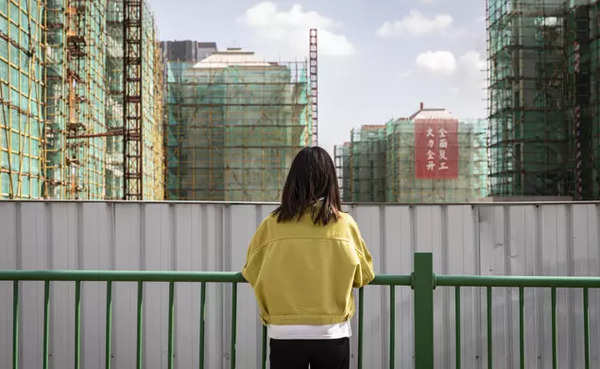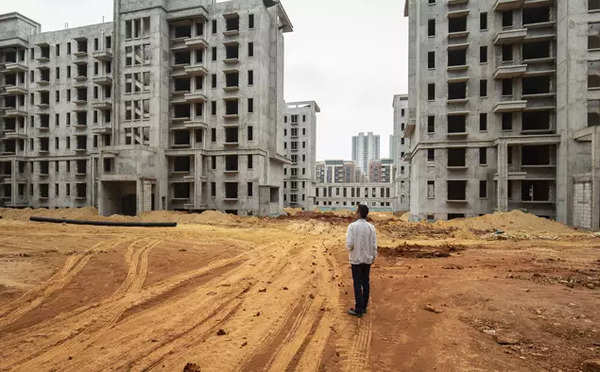They put down tens of thousands of dollars for it. But months past its scheduled completion, a concrete shell with wiring protruding from the walls and piles of dirt on the floor was all there was to show for the expense. Soon, even their marriage unraveled.
In another city, a man bought a space for a business he thought would help give his young son a better future. A woman paid for an apartment where she imagined her toddler would grow up safe, and she might have a second child. In Shanghai, a technician from a small town thought she had made her parents proud by buying a new home in the big city.
What these and hundreds of thousands of other Chinese homebuyers couldn’t have known was that the country’s decadeslong real estate boom would come to a sudden halt. Developers ran out of money amid a government crackdown on excessive debt and a slowing economy. They stopped building.
Across the country, instead of apartment towers, uninhabitable concrete structures rise up from idle, overgrown construction sites. Infuriated homebuyers in more than 100 cities rose up in a rare act of collective rebellion last year, vowing not to repay loans on unfinished properties.
We talked to four people who emptied their life savings and took out huge loans for homes that have not been completed. They told us about their frustration and showed us the apartments that are now ugly reminders of dreams dashed and promises broken.
Xu Feng visits Xinli City, where he purchased an apartment that may never be built, in Nanchang, China, Oct. 29 (Qilai Shen/The New York Times)
“It was a simple dream — to have a home, a family,” Tang said.
When Tang and his fiancee set out to buy a home in 2019, they were drawn to Haiyi Changzhou, one of the hottest projects in the northeastern city of Dalian. Its developer promised a sprawling complex of high-rises with serene landscaping and privacy, offering “a beautiful life close to the sea.”
The couple bought a modest two-bedroom apartment for around $177,000. To cover the required down payment of $74,000, they used their savings and got their parents to pitch in. Tang, who works in a restaurant, sold a small place he had out in the countryside.
They signed a contract for the apartment in 2019, then got their marriage license. The plan was to hold a wedding after the apartment was completed and move in together.
“At the time, we told our friends around us that we had bought a home here; we were very proud,” said Tang, who spoke on condition that he be identified by his nickname, Chao, because of the political sensitivity of the topic. “I come from the countryside; it felt good to be able to buy an apartment somewhere.”
The apartment was slated for completion last August, but Sunac China Holdings, the project’s developer, has been mired in financial trouble.
In September, the owners of more than 2,600 unfinished units in the Haiyi Changzhou development threatened to stop paying their mortgages.
Tang said his wife grew tired of waiting for a home that might never get finished and a new life that might never start. In November, they filed for divorce. He is still paying $550 a month in mortgage payments.
“When I think about the unfinished apartment, it’s as if I’m falling from heaven to hell,” Tang said. “I have nothing to look forward to in life — no apartment, no wife.”
In the eastern city of Nanchang, a street divides “Xinli City,” a development with more than 4,000 apartments, into two sections. On one side are fully occupied residential towers, surrounded by trees. On the other side, row after row of unfinished concrete structures, with no paint, no windows — and no sign of progress.
Andie Cao, a sales representative in her 20s, owns an apartment on the wrong side. Whenever she looks at the finished buildings, she sees the life she was once promised.
Cao bought the three-bedroom apartment in 2019 for $203,000. The price was high, but she and her husband had just had a baby and were thinking of having another. They liked that the developer’s plan for the large apartment complex included a kindergarten and an elementary school.
Her apartment had been scheduled for completion in November 2021, just in time for her child to start kindergarten. But the developer, Sinic Holdings Group, stopped work in August 2021 when it hit financial trouble, and has yet to finish building the apartments.
Cao had already handed over more than $80,000 for the apartment, money she had saved from toiling away in Shanghai. Then in July 2022, she joined other homebuyers around the country in a mortgage payment strike over unfinished homes.
“I will not pay until they deliver, and I’m willing to pay a fine by then, but we will not be exploited and bled dry.”
The homebuyers’ campaign has drawn the attention of authorities. The police call her from time to time, warning her not to take any drastic action. Some homebuyers who protested had been detained.
“What did we do wrong to deserve being treated like this?” she said. “I just don’t understand.”

Daisy Xu looks at unfinished apartment buildings at Royals Garden, a housing development where her family has purchased a unit in Shanghai on Oct. 30, 2022. (Qilai Shen/The New York Times)
Cao and her husband continue to work and pay rent in Shanghai. She doesn’t think the apartment will be completed and can’t imagine trying to buy another home or having a second child.
“I feel like the past few years’ hard work has been for nothing.”
Daisy Xu, a 28-year-old lab technician, remembers the day she bought her apartment in Shanghai as if it were yesterday.
She had waited anxiously with hundreds of other prospective buyers in a hotel ballroom at a sales event for Royals Garden, a new development. When her turn finally came, she was given less than a minute to pick an apartment.
She scanned a wall on which were pinned strips of paper bearing the unit numbers of apartments that had not yet been sold. She knew she didn’t want the penthouse or anything lower than the fourth floor. She selected an apartment on the eighth floor, and told a sales employee. He tore the strip off the wall and handed it to her.
“Congratulations, new homeowner!” a presenter announced.
Xu was exhilarated. The apartments sold out that day, dashing the hopes of many others who had been behind her in line.
“I was so thrilled and happy, I immediately took a photo of the unit number and told people back home of the good news,” Xu said.
The apartment cost around $495,000, a hefty price tag but affordable compared with older homes in Shanghai. She wanted a place with two bathrooms, giving her parents or in-laws more privacy if they visited. The property looked out on a river and was steps away from a bustling street full of restaurants.
Xu was supposed to get the keys in September and move in early this year. But the complex is nowhere close to being done. The unpainted 16-story building is wrapped in green netting and surrounded by weeds and debris. It pains her to see the site on her way to work from an apartment she rents nearby.
In China, about 90% of new homes are sold before they are built. This presale model allows developers to raise cash quickly but shifts much of the risk to buyers like Xu. They are expected to pay in full before construction starts, often taking out mortgages to do so.
Regulations require that the money from presales only be used for construction of that project. But until recently, supervision was lax and developers would use the funds for whatever they wanted, including starting other projects.
As home prices soared, the government tightened financing rules for developers in the hope of preventing a housing sector collapse. Many large developers — like China Fortune Land Development of the Royals Garden project in Shanghai — buckled under the weight of massive debt and had to stop work.
Despite the delay, Xu continues to fork out more than $1,300 every month in mortgage payments.
She said that she was hiding the problem from her parents. She is from a small town in southern China, and owning property in Shanghai had been the ultimate proof that she had made it.
“I dodge their questions about the apartment, but how much longer can I keep doing that?”
Xu Feng remembered 2019 as a good year. The grocery store in the eastern city of Nanchang that he rented and operated with his wife was doing well. He thought it was time to own his own store.
He found the perfect spot: a 1,000-square feet, $163,000 space on the first floor of a residential tower. It was part of Xinli City, the same giant complex of thousands of apartments where Cao, the service worker, had also bought a unit.
Xu had to sell some goods at a loss to come up with the down payment of about $81,000 and take out a 10-year mortgage. He enrolled his son in an elementary school in Nanchang.
Three years later, Xinli City is still unfinished. Xu said that he was under immense financial stress, paying for rent on their current business on top of repaying his mortgage. He stopped eating out with friends and cut back on spending except for tuition for his son.
“I never thought this would happen to me,” he said. “I’m afraid to have another child. The income and expenses barely break even.”
Frustrated by the delay, Xu and hundreds of homebuyers have protested several times over the past year.
They gathered outside the local government, on public squares and even hung banners from the top of a building. But so far, nothing has worked and many people have been detained at protests, he said.
In August, Xu stopped paying his mortgage. This has affected his credit standing and forced him to rely on relatives to take out loans to keep his business afloat. But he said he no longer holds any hope that the government would intervene and help people like him.
“We’ve been through too much while trying to fight for our rights,” he said. “Government officials only look out for each other and don’t do any good for regular people.”
